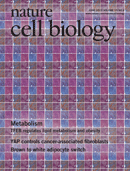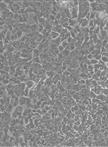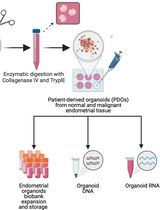- EN - English
- CN - 中文
Isolation and Immortalization of Fibroblasts from Different Tumoral Stages
不同肿瘤阶段成纤维细胞的分离和永生化
发布: 2014年04月05日第4卷第7期 DOI: 10.21769/BioProtoc.1097 浏览次数: 20309
Abstract
Tumour microenvironment and cancer-associated fibroblasts in particular exhibit tumour promoting abilities that are not present in their normal counterparts (Calvo et al., 2013; Hanahan and Coussens, 2012). Therefore, functional and molecular characterization of the modifications occurring in fibroblasts during tumour progression is essential to fully understand their role in tumour progression. Previous studies have addressed this issue using human fibroblasts and comparing normal and adjacent fibroblasts to tumour-associated fibroblasts (Kalluri and Zeisberg, 2006). However, these studies are hampered by the intrinsic variability of human samples (e.g. pairing, age, genomic landscape, etc). In order to overcome these issues, we used a fully characterised mouse breast cancer model, MMTV-PyMT (Guy et al., 1992; Lin et al., 2003). MMTV-PyMT transgenic mice express the Polyoma Virus middle T antigen under the direction of the mouse mammary tumor virus promoter/enhancer. This is a multifocal luminal breast cancer model that goes through well defined and characterised stages (namely, hyperplasia, adenoma, carcinoma and invasive carcinoma). Interestingly, this model has a 100% incidence, is very desmoplastic (presenting high concentration of fibroblasts) and gives raise to spontaneous metastasis in the lung with 80-94% incidence. Importantly, at least for the inguinal mammary glands (glands 4 and 9), the different tumoral stages are well correlated to the age of the mouse: hyperplasia arising at 6 weeks of age, adenoma between 6-8 weeks of age, carcinoma and invasive carcinoma from 8 weeks onwards. This model allowed us to confidently isolate fibroblasts from different tumoral stages and carefully characterise their functional and molecular properties (Calvo et al., 2013).
Materials and Reagents
- FVB/n MMTV-PyMT females between 4 and 14 weeks of age and MMTV-PyMT negative siblings for isolation of normal mammary gland fibroblasts (NFs) (The Jackson Laboratory, catalog number: 00 2374 )
- Phoenix-Eco packing cells (ATCC, catalog number: CRL-3214 ) (read Note 6 for more information)
- pBabe-HPV-E6-puromycin plasmid (or immortalization plasmid of choice, see Note 6)
Note: This was generated in our laboratory but there are alternatives available (pLenti-puro-HPV-16 E6/E7; Applied Biological Materials, catalog number: G268 ). - Dulbecco’s Modified Eagle’s Medium (DMEM) (high glucose with stable L-glutamine) (Life Technologies, Gibco®, catalog number: 41966-029 )
- 50x sodium butyrate (500 mM)
- Polybrene® (1,5-dimethyl-1,5-diazaundecamethylene polymethobromide, hexadimethrine bromide) (Sigma-Aldrich, catalog number: AL-118 ) (1000x solution at 2 mg/ml)
- Insulin-Transferrin-Selenium (ITS) solution (Life Technologies, catalog number: 51300-044 ).
- Calcium phosphate transfection kit (ProFection® Mammalian Transfection System) (Promega Corporation, catalog number: E1200 )
- Fetal Bovine Serum (FBS)
- Phosphate-buffered saline (PBS)
- PBS without Ca2+ and Mg2+
- Penicillin/Streptomycin
- EDTA (1 mM in PBS without Ca2+ and Mg2+)
- 10% formalin solution, neutral-buffered (10% NBF)
- 100x Collagenase/dispase (100 mg/ml) (Roche Diagnostics, catalog number: 11097113001 )
- 1000x puromycin (2 mg/ml) (Sigma-Aldrich, catalog number: P9620 )
- 1000x DNase I (10 mg/ml) (Sigma-Aldrich, catalog number: D4513 )
- Trypsin/EDTA
- Virkon (DuPont Rely+On Virkon, catalog number: 1235-8667 )
- Complete media (see Recipes)
Equipment
- 0.22 µm, 0.45 µm, 3 mm filters
- 20 mm coverslip
- Tissue culture plastic-ware
- 37 °C shaker
- Tissue culture laminar-flow hood
- 10 cm tissue culture dish
- Centrifuge
- 37 °C, 5% CO2, cell culture incubator
- Scalpels
- Surgical scissors
- Dissecting instruments
Procedure
文章信息
版权信息
© 2014 The Authors; exclusive licensee Bio-protocol LLC.
如何引用
Calvo, F., Hooper, S. and Sahai, E. (2014). Isolation and Immortalization of Fibroblasts from Different Tumoral Stages. Bio-protocol 4(7): e1097. DOI: 10.21769/BioProtoc.1097.
分类
癌症生物学 > 通用技术 > 动物模型 > 细胞分离和培养
癌症生物学 > 侵袭和转移 > 肿瘤微环境 > 组织分离
细胞生物学 > 细胞分离和培养 > 细胞分离
您对这篇实验方法有问题吗?
在此处发布您的问题,我们将邀请本文作者来回答。同时,我们会将您的问题发布到Bio-protocol Exchange,以便寻求社区成员的帮助。
Share
Bluesky
X
Copy link













